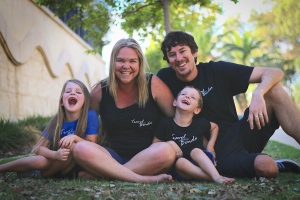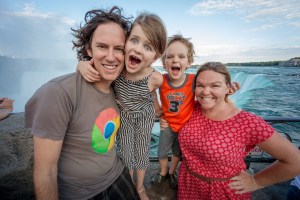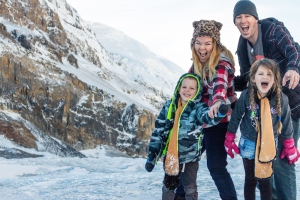I met the Benders online. Through connections about Australia, traveling, blogging and world wide adventures, we connected through social media. I’ve followed their adventures and we’ve chatted about favourite spots across the globe. As an educators who spent years in traditional public school, I am constantly thrilled to see children exploring the world, learning by doing and families figuring out education that works for them. This family is sharing their joy of adventure and exploration with the next generation. Erin and Josh traverse the globe with their little ones in tow. Whether you follow their journey or their lead – their story is compelling. Check them out at Travel with Bender.
1.Why did your family decide to make the jump to a location independent? It’s my husband’s entire fault. It took him roughly 2 years to convince me to do 6 months. In the end I thought 6 months sounded like a cool adventure and agreed. It’s now been 4 years.
2.How did you save money to be able to afford living ‘on the road’? How do you earn money while living life as digital nomads? My husband was a self-employed web designer and only needed his computer and wifi to continue working from anywhere in the world. So we saved up a small “emergency” fund and left. He continued to work on the road for the first two years of our travels until our blog took off. Now we make money from many different streams – the blog, photography, website templates/modules, freelance writing and affiliate marketing.
3.How much money do you traditionally need annually to support this lifestyle? How long is a piece of string? How big is the family? Or are you single? Do you like hostels and budget food or do you want 2 bedrooms and a pool? Where are you headed- somewhere expensive like New York or London or somewhere budget friendly like Bali or Mexico? We have interviewed people who have travelled on less then $12,000 a year. The easiest way to determine how much you need is to decide on those factors above and then go from there.
4.How do you handle visas, vaccinations, legal documents/passports, taxes and healthcare while living without a home base or an ever-changing one? We have visited back home (Australia) in 2014 and 2015, usually with a long list of things to do. These include renewing driver’s licenses, getting new passports and visiting the doctor. We also never travel without travel insurance, which means we are covered for healthcare the world over. We also have a PO Box for all our mail and a service, which scans it and emails it to us.
5.If you decide to settle somewhere – where and when do you think it will be? Great question. We have no plans to settle. But we are always looking. So far Kuala Lumpur (Malaysia), Australia, Canada and the US are all on the favourite lists (with many regular visits to Bali).
6.In your experience, what have been the two most significant gifts of travel? That wherever you go people are just the same – they have a home, they have children, they smile and they eat. And the gift of friendship. We have made some of very best friends from being on the road. One family we have met in 6 different countries.
7.How do you manage the education of your children? Travel is supplying the best part of their education. It teaches them geography, like no classroom can. They learn basic physics in science museums all over the world. Their educational experience is far broader than what could be taught in a classroom. Our kids (5 & 7-years-old) do not undertake a traditional formal education. They utilise programs they love on the computer and we use some educational workbooks and reading books.
8.How do they feel being world travelers and moving from place to place regularly? They are torn. They love the freedom of theme parks and playgrounds, but I think sometimes they wish they could just stay home. We are working on that this year with a much slower pace of travel then we have done previously.
9.What do you think they gain (now and in the future) from living life this way as opposed to a ‘traditional upbringing’? That anything is possible. That they can be whatever they want. That race, nor country, nor religion defines who you are, who your friends can be or what you will do in life. That everyone deserves a smile, some food, some shelter. We hope many things for them, but I guess only time will tell.


